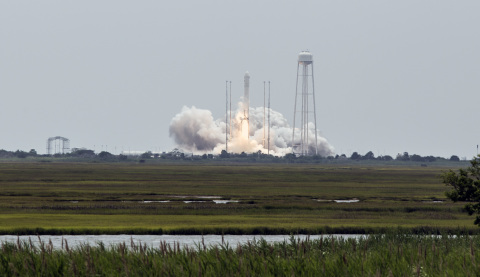DULLES, Va.--(BUSINESS WIRE)--Orbital Sciences Corporation (NYSE:ORB), one of the world’s leading space technology companies, today announced it successfully launched its Antares™ medium-class rocket carrying a Cygnus™ cargo logistics spacecraft, beginning the company’s second operational cargo resupply mission to the International Space Station (ISS). Cygnus will deliver vital equipment, supplies and scientific experiments to the ISS as part of its $1.9 billion Commercial Resupply Services (CRS) contract with NASA. More information about the CRS mission is available at http://www.orbital.com/NewsInfo/MissionUpdates/Orb-2/.
Lift-off of the Antares rocket occurred today at 12:52 p.m. (EDT) from the Mid-Atlantic Regional Spaceport’s Pad 0A located NASA’s Wallops Flight Facility in eastern Virginia. Following a 10-minute ascent, the Cygnus spacecraft was successfully deployed and placed into its intended orbit of 120 x 180 miles (190 x 290 kilometers) above the Earth, inclined at 51.6 degrees to the equator. Orbital’s engineering team has confirmed that reliable communications had been established and that the solar arrays are fully deployed, providing the necessary electrical power to command the spacecraft.
The launch of Orbital’s Antares rocket and Cygnus cargo logistics spacecraft will culminate in rendezvous and berthing with the ISS on July 16 at approximately 6:39 a.m. (EDT). Cygnus will deliver 3,669 pounds (1,664 kilograms) of cargo to the Expedition 40 astronauts and remain attached to the station approximately 30 days before departing with approximately 2,950 pounds (1,340 kilograms) of disposable cargo for a safe, destructive reentry over the Pacific Ocean approximately five days later.
“Today’s mission was the fourth successful launch of Antares in the past 15 months and the third deployment of Cygnus in less than a year,” said Mr. David W. Thompson, Orbital’s President and Chief Executive Officer. “So far, our second operational CRS mission is off to a great start with Cygnus operating exactly as anticipated at this early stage of the mission. We are very pleased to be a reliable partner with NASA to meet their need for reliable, regularly scheduled cargo resupply for the ISS. I salute the combined NASA and Orbital team for its hard work to get us to this point, and look forward to completing another safe and successful mission for our NASA customer.”
Under the CRS contract with NASA, Orbital will use Antares and Cygnus to deliver approximately 44,000 pounds (20,000 kilograms) of cargo to the ISS over eight missions through 2016. For these missions, NASA will manifest a variety of essential items based on ISS program needs, including food, clothing, crew supplies, spare parts and equipment, and scientific experiments.
Orbital privately developed the Antares launch vehicle to provide low-cost, reliable access to space for medium-class payloads. It is the largest and most complex rocket the company has ever produced. Under the Commercial Orbital Transportation Services (COTS) joint research and development initiative with NASA, Orbital also developed the Cygnus spacecraft, which is an advanced maneuvering vehicle that meets the stringent human-rated safety requirements for ISS operations. Together, these products showcase Orbital’s ability to apply rigorous engineering approaches and commercial business practices to significantly shorten development timelines and lower operational costs of sophisticated space systems as compared to traditional government-run programs.
About Antares
The Antares medium-class launch vehicle represents a major increase in the payload launch capability that Orbital can provide to NASA, the U.S. Air Force and commercial customers compared to its heritage small-class space launch vehicles such as Pegasus, Taurus and Minotaur. The Antares rocket can launch spacecraft weighing up to 14,000 lbs. (6,400 kg.) into low-Earth orbit, as well as lighter-weight payloads into higher-energy orbits. Orbital’s newest launcher has completed three successful missions and is currently on-ramped to both the NASA Launch Services-2 and the U.S. Air Force’s Orbital/Suborbital Program-3 contracts, enabling the two largest U.S. government space launch customers to order Antares for “right-size and right-price” launch services for medium-class spacecraft. For more information on Antares, visit http://www.orbital.com/LaunchSystems/SpaceLaunchVehicles/Antares/.
About Cygnus
Orbital developed the Cygnus cargo spacecraft as part of its COTS joint research and development initiative with NASA. Cygnus consists of a common Service Module (SM) and a Pressurized Cargo Module (PCM). The SM incorporates avionics, power and propulsion systems already successfully flown aboard dozens of Orbital’s LEOStar™ and GEOStar™ satellite products. The PCM, designed and built by Thales Alenia Space under a subcontract from Orbital, is based on the Multi-Purpose Logistics Module (MPLM) used with the Space Shuttle. For more information on Cygnus, visit http://www.orbital.com/AdvancedSystems/Publications/Cygnus_factsheet.pdf.
About Orbital
Orbital develops and manufactures small- and medium-class rockets and space systems for commercial, military and civil government customers. The company’s primary products are satellites and launch vehicles, including low-Earth orbit, geosynchronous-Earth orbit and planetary exploration spacecraft for communications, remote sensing, scientific and defense missions; human-rated space systems for Earth-orbit, lunar and other missions; ground- and air-launched rockets that deliver satellites into orbit; and missile defense systems that are used as interceptor and target vehicles. Orbital also provides satellite subsystems and space-related technical services to U.S. Government agencies and laboratories. More information about Orbital can be found at http://www.orbital.com. Follow the company on Twitter @OrbitalSciences.




